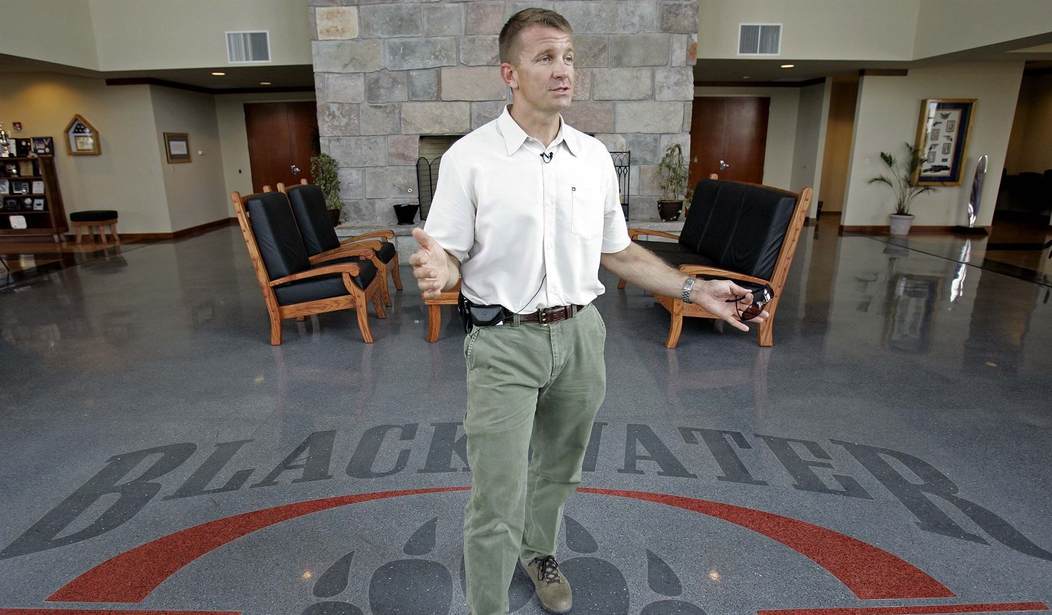We've fought in Afghanistan for 16 years now. Are we making progress?
After 9/11, we invaded, overthrew the Taliban, killed Osama Bin Laden and -- stayed. Afghanistan is now America's longest war, ever.
President Trump's solution? He'll send several thousand more soldiers.
Erik Prince says he has a better idea -- fight terrorists with only 2,000 American Special Operations personnel, plus "a contractor force" of 6,000.
Prince is the founder of Blackwater, the private military contractor.
The military uses contractors to provide security, deliver mail, rescue soldiers and more. Private contractors often do jobs well, for much less than the government would spend.
"We did a helicopter resupply mission," Prince told me. "We showed up with two helicopters and eight people -- the Navy was doing it with 35 people."
I asked, "Why would the Navy use 35 people?"
Prince answered, "The admiral that says, 'I need 35 people to do that mission,' didn't pay for them. When you get a free good, you use a lot more of it."
Prince also claims the military is slow to adjust. In Afghanistan, it's "using equipment designed to fight the Soviet Union, (not ideal) for finding enemies living in caves or operating from a pickup truck."
I suggested that the government eventually adjusts.
"No, they do not," answered Prince. "In 16 years of warfare, the army never adjusted how they do deployments -- never made them smaller and more nimble. You could actually do all the counter-insurgency missions over Afghanistan with propeller-driven aircraft."
So far, Trump has ignored Prince's advice. I assume he, like many people, is skeptical of military contractors. The word "mercenary" has a bad reputation.
Recommended
But private contractors have fought for America since America began. Jamestown, Plymouth and Massachusetts Bay colonies all hired private security. During the Revolutionary War, the Continental Congress authorized "privateers" -- privately owned boats -- to fight British ships.
Before America officially entered World War II, some American pilots made money privately fighting the Japanese. Those "Flying Tigers" were called heroes. John Wayne made a movie about them.
"Markets have a way of providing things when government can't," says Prince.
But contracting is no panacea. The Congressional Budget Office says that although they save the government money during times of peace, during war "costs of a private security contract are comparable with those of a U.S. military unit."
Economist Tyler Cowen points out that private contractors may make the real pain of war less apparent. In Iraq, says Cowen, "use of contractors may have helped to make an ill-advised venture possible."
And in Iraq, Prince's employees killed civilians. Four Blackwater employees were eventually convicted of voluntary manslaughter.
Prince replied, "The guys did more than a hundred thousand missions, protective missions, in dangerous war zones. In less than one half of 1 percent of all those missions did the guys ever discharge a firearm."
Government has its own record of mistakes, civilian deaths and war crimes, too.
In 2010, Prince sold his security firm and moved on to other projects.
He persuaded the United Arab Emirates to fund a private anti-pirate force in Somalia. The U.N. called that a "brazen violation" of its arms embargo, but Prince went ahead anyway.
His mercenaries attacked pirates whenever they came near shore. His private army, plus merchant ships finally arming themselves, largely ended piracy in that part of the world. In 2010, Somali pirates took more than a thousand hostages. In 2014, they captured none.
Did you even hear about that success? I hadn't before doing research on Prince. The media don't like to report good things about for-profit soldiers. Commentator Keith Olbermann called Blackwater "a full-fledged criminal enterprise." One TV anchor called Prince "horrible ... the poster child for everything wrong with the military-industrial complex."
When I showed that to Prince, he replied, "the hardcore anti-war left went after the troops in Vietnam ... (I)n Iraq and Afghanistan they went after contractors ... contractors providing a good service to support the U.S. military -- vilified, demonized, because they were for-profit companies."
If we don't use private contractors, he added, we will fail in Afghanistan, where we've "spent close to a trillion dollars and are still losing."

























Join the conversation as a VIP Member